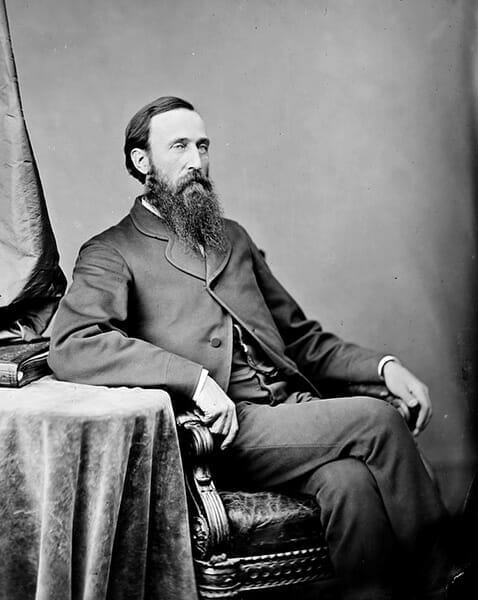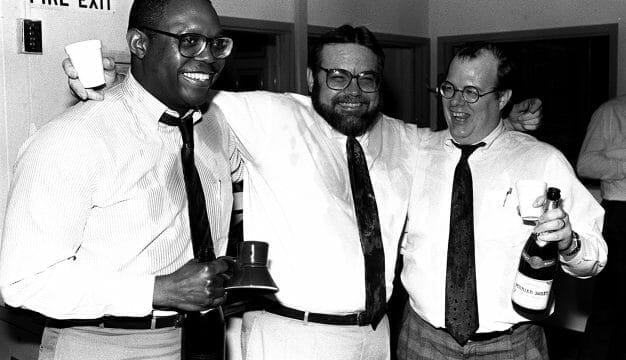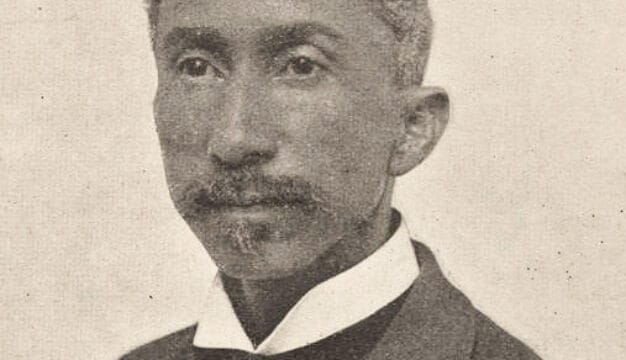Alfred Buck
Alfred Eliab Buck (1832-1902) served as a commander in the Union Army during the American Civil War. Like many northerners after the war, Buck and his family settled in Alabama, where he became a Republican delegate to the state Constitutional Convention of 1867 during Reconstruction. He went on to serve in various political offices before being elected to the U.S. House of Representatives from Alabama’s First Congressional District in the Forty-first Congress, serving from 1869-1871. He also served as the chairman of the Georgia Republican Party and Minister to Japan under Pres. William McKinley.
 Alfred Buck
Buck was born in Foxcroft, Maine, on February 7, 1832, to Benjamin Thomas Buck and Elmira Todd Buck; he had least five siblings. After attending Foxcroft Academy, Buck entered Waterville College (present-day Colby College), graduating in 1859. Thereafter, he taught in Hallowell for one year and then became the principal of the high school at Lewiston. With the outbreak of the American Civil War in April 1861, Buck helped to raise the Thirteenth Maine Regiment, for which he was commissioned as a captain in Company C on October 18, 1861. His brother Charles Miller Buck also enlisted with Alfred as a private, and the regiment was mustered in at Augusta, Maine, on December 4, 1861. The regiment was attached to Maj. Gen. Benjamin F. Butler’s Expeditionary Force on February 8, 1862, and primarily saw garrison duty in various regions around the Gulf of Mexico before being assigned to the defenses of New Orleans, Louisiana, in December 1862.
Alfred Buck
Buck was born in Foxcroft, Maine, on February 7, 1832, to Benjamin Thomas Buck and Elmira Todd Buck; he had least five siblings. After attending Foxcroft Academy, Buck entered Waterville College (present-day Colby College), graduating in 1859. Thereafter, he taught in Hallowell for one year and then became the principal of the high school at Lewiston. With the outbreak of the American Civil War in April 1861, Buck helped to raise the Thirteenth Maine Regiment, for which he was commissioned as a captain in Company C on October 18, 1861. His brother Charles Miller Buck also enlisted with Alfred as a private, and the regiment was mustered in at Augusta, Maine, on December 4, 1861. The regiment was attached to Maj. Gen. Benjamin F. Butler’s Expeditionary Force on February 8, 1862, and primarily saw garrison duty in various regions around the Gulf of Mexico before being assigned to the defenses of New Orleans, Louisiana, in December 1862.
On August 16, 1863, Buck was promoted to the rank of lieutenant colonel of the Twentieth Louisiana Corps d’Afrique (made of up of free people of color), which later became the Ninety-first Regiment U. S. Colored Troops (USCT). In 1864, Alfred married Ellen Baker, the daughter of Henry Knox Baker, a judge from Hallowell, Maine. That October, Buck transferred to the Fifty-first Regiment USCT, which served in various posts throughout the Department of the Gulf before seeing combat in the early April attack on Fort Blakeley as part of the Union attempt to capture Mobile, Mobile County. For his gallant conduct in battle, Buck was brevetted to the rank of full colonel on April 8, 1865. He was then made inspector-general for western Louisiana until he and his unit were mustered out of service in Baton Rouge, Louisiana, on June 16, 1866.
After the war, Alfred moved his family to Mobile, where he became involved in the manufacture of turpentine on Montgomery Island in Mobile until a fire destroyed his business in 1867. He also entered into the iron-smelting business with his brother-in-law, William B. Wood, who would later serve on the U.S. Supreme Court from 1881 to 1887. Appointed by Gen. John Pope, governor of the Reconstruction Third Military District, as the clerk of the Mobile County state court, Buck was then chosen as a Republican delegate to Alabama’s Constitutional Convention of 1867. Largely made up of Republicans, the convention ratified the document in February 1868, opting not to disenfranchise former Confederates, while pushing for African American equality and creating a system of public education. It also enabled the state to rejoin the Union. He then served as the clerk of the circuit court of Mobile County until 1868. Buck was thereafter elected from Alabama’s First Congressional District to the U.S. House of Representatives, serving from March 4, 1869, through March 3, 1871, succeeding Republican Francis W. Kellogg. For reasons as yet unknown, Buck declined to run for reelection and was appointed president of the city council of Mobile in 1873. His congressional seat was taken by African American politician Benjamin S. Turner of Selma. That same year, Buck moved to Atlanta, Georgia, to take a position as the clerk of the U.S. circuit and district courts, serving from 1873 to 1887. During this time, Buck was elected chairman of the Republican Party of Georgia in 1882. From 1889 to 1893, he served as the U.S. marshal for the northern district of Georgia and was a member of the Georgia delegation to each national convention from 1880 through 1896.
In early 1897, as Buck’s political power grew, Republicans from across the South petitioned president-elect William McKinley to appoint him U.S. Minister to Mexico. The post instead went to Powell Clayton of Arkansas, and McKinley appointed Buck as U.S. Minister to Japan in April 1897. On December 4, 1902, while on a duck-hunting trip with the Japanese emperor, Buck suffered a fatal heart attack. He was buried in Arlington National Cemetery in Arlington, Virginia.
Additional Resources
Bhurtel, Shyam Krishna. “Alfred Eliab Buck: Carpetbagger in Alabama and Georgia.” Ph.D. diss., Auburn University, 1981.



